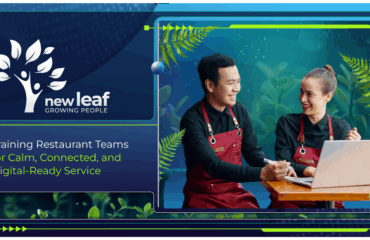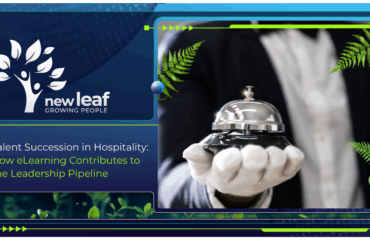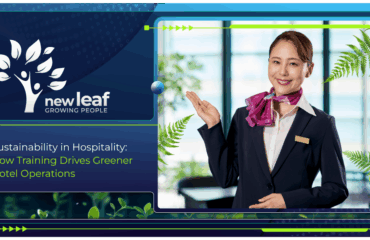
In the hospitality industry, promoting from within is often the fastest route to filling management gaps. However, when undertaken without proper preparation, it can also be one of the costliest endeavours.
High-performing staff don’t automatically become effective leaders, and the fallout of poor leadership is felt in turnover, morale, and service quality.
As the industry rebuilds, hospitality management training through eLearning offers a smarter, scalable way to grow confident, capable leaders, without taking them off the floor.
Key Takeaways
- Promoting unprepared managers leads to higher turnover, lower morale, and inconsistent guest experiences.
- eLearning bridges the “promotion gap” by turning operational excellence into leadership confidence.
- Scenario-based learning builds real-world management skills, from conflict resolution to financial accountability.
- Platforms like Articulate 360 and aNewSpring accelerate leadership readiness across distributed teams.
- Measurable metrics such as retention, satisfaction, and performance show the ROI of hospitality leadership training.
The Promotion Gap: Why Great Performers Struggle in Management Roles
In a fast-paced hotel or restaurant workplace, top performers often earn promotion as a reward for operational excellence. But leadership demands a different skillset altogether; one rooted in communication, empathy, delegation, and foresight.
When employees are promoted without leadership training, they face what’s known as the “promotion gap” — the disconnect between technical competence and managerial capability.
The cost of this gap is measurable. Industry data suggests that replacing an employee can cost up to six to nine months’ salary. Plus, a study published in Sage Journals, titled Organizational Culture and Turnover in the Hospitality Industry, shows that culture and leadership are decisive in employee retention. This means that untrained or poorly prepared managers contribute to higher turnover, which has cost implications..
In hospitality, where customer satisfaction, professional reputation, and staff morale are closely intertwined, one unprepared manager can ripple disruption across the entire guest experience.
Untrained leaders may micromanage others, struggle with conflict resolution, or fail to inspire their teams. Over time, this leads to burnout and inconsistent service quality. Closing this gap starts with rethinking how leadership readiness is developed through accessible, flexible, and personalised learning solutions.
“Hospitality runs on human connection. When we invest in leadership training, we’re not just developing managers — we’re cultivating the people who inspire service excellence, team loyalty, and lasting guest relationships.”
— Michael Hanly, Managing Director, New Leaf Technologies
Essential Management Competencies for Hospitality
The transition from frontline excellence to effective leadership means shifting from “doing the work” to guiding others to perform. Strong hospitality managers require a mix of soft skills and strategic insight, including:
- Coaching and communication: Empowering teams, giving constructive feedback, and encouraging collaboration.
- Conflict resolution: Handling interpersonal challenges and guest complaints with empathy and professionalism.
- Financial accountability: Understanding cost control, budgeting, and profitability.
- Strategic thinking: Anticipating demand, aligning teams with sustainability and business goals, and driving innovation.
Consider a restaurant manager faced with high staff turnover. A skilled leader wouldn’t simply refill the vacancies. Instead, they would analyse why employees are leaving, implement changes to improve engagement, and champion recognition programs that retain talent.
Similarly, in today’s sustainability-conscious travel industry, managers also play a pivotal role in embedding greener practices into daily operations. eLearning to develop leadership helps managers connect leadership decisions to sustainability outcomes, such as energy efficiency or waste reduction, and builds stronger teams and more responsible businesses.
For deeper insight, explore how training drives greener hotel operations.
How Digital Learning Accelerates Leadership Readiness
Traditional hospitality management training, whether it involves hotel customer relations or restaurant manager development, often requires managers to be off-site, disrupting daily operations. This is something most hotels and restaurants can’t afford.
eLearning helps bridge the leadership development gap with flexible, scenario-based training that accommodates shifts and schedules.
Platforms such as Articulate 360 enable L&D (Learning and Development) teams to create immersive, interactive simulations tailored to hospitality scenarios, such as resolving guest complaints or managing double-booked rooms. Learners can exercise their decision-making skills in a risk-free environment and receive instant feedback to refine their approach.
aNewSpring LXP (Learning Experience Platform), one of New Leaf Technologies’ core online learning platforms, uses adaptive learning pathways that adjust eLearning content based on each learner’s progress. Emerging managers can master the fundamentals, such as people management and financial literacy, before progressing to more complex modules on leadership strategy, sustainability, or digital transformation.
For HR managers, this approach makes leadership development more scalable, consistent, and data-driven. Hospitality management training can be rolled out across multiple properties or franchises, tracked in real time, and updated easily to reflect evolving standards. It’s an agile way to build the leadership pipeline without slowing down operations.

And we have the data to back it up. New Leaf Technologies successfully worked with City Lodge Hotel Group (CLHG) in their employee development program.
“We currently have 1,200 employees on the aNewSpring solution, and I can easily track how they are doing with the course materials, allowing us to make modifications or assist learners who may be struggling.”
— Sheree Snyman, Group Skills Development Facilitator, CLHG
For more information, read our expert blog on Talent Succession in Hospitality: How eLearning Contributes to the Leadership Pipeline.
Measuring Management Development Success
Effective hospitality management training is all about outcomes. With eLearning platforms powered by New Leaf Technologies’ groundbreaking Training Intelligence System, HR and L&D teams can track measurable indicators of leadership growth, including:
- Retention rates: Improved leadership reduces staff turnover and builds stronger team cohesion.
- Team performance metrics: Service scores, upselling rates, and productivity levels improve under capable managers.
- Employee satisfaction surveys: Higher engagement and trust reflect the influence of empathetic, well-trained leaders.
Advanced data dashboards built into platforms like aNewSpring make it easy to correlate training progress with operational results. For instance, properties that invest in structured manager development often report higher guest satisfaction scores and lower absenteeism, providing direct proof of training’s impact on culture and profitability.
Over time, the ROI becomes self-evident: fewer costly replacements, better service quality, and a leadership team equipped to handle both people and performance challenges.
Conclusion: The Smarter Path to Leadership Excellence
As Michael rightly says, hospitality thrives on human connection, and great managers make that possible. By combining operational experience with structured, scenario-based learning, hotels and restaurants can nurture leaders who not only motivate teams but also drive service excellence and sustainability.
Don’t let your next promotion become your next problem. Partner with New Leaf Technologies to build leadership programs that prepare your best talent for management success.
Ready to transform your hospitality leadership pipeline? Book a demo of Articulate 360 and aNewspring LXP and discover how digital learning can fast-track your hospitality manager development journey.
FAQs
How long would it take to prepare a high-performing employee for a management role through eLearning?
With modular, flexible programs, emerging leaders can begin applying lessons within weeks. A complete eLearning pathway typically takes three to six months, depending on the learner’s pace and the complexity of the competencies covered.
What’s the difference between general management vs. hospitality-specific leadership training?
General management focuses on universal leadership skills; hospitality training contextualises these to service environments, dealing with guests, managing shift-based teams, and real-time operational decisions. It bridges soft skills with service excellence.
Would eLearning replace traditional mentorship, or could they work together?
They complement each other. eLearning builds foundational knowledge efficiently, while mentorship personalises growth through feedback and role modelling. Together, they create a powerful, blended learning approach to leadership readiness.




